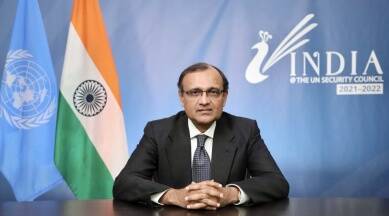Some terrorist groups have made a “mockery” of the UN Security Council’s sanction regimes by taking full advantage of carve-outs given for humanitarian purposes, India said as it made a veiled reference to Pakistan, saying proscribed terrorist groups in the neighbourhood have re-branded themselves as humanitarian organisations to evade sanctions.
“It is imperative that sanctions do not impede legitimate humanitarian requirements. However, it is important to exercise due diligence while providing humanitarian carve-outs, especially in cases where terrorism finds safe-havens,” India’s Permanent Representative to the UN Ambassador T.S. Tirumurti said on Monday.
Speaking at the UN Security Council Open Debate hosted by Council President Russia on ‘General issues relating to Sanctions: Preventing their humanitarian and unintended consequences’, Tirumurti said there have been examples of terrorist groups taking full advantage of humanitarian carve-outs, “making a mockery of sanction regimes,” including that of 1267 Al Qaeda Sanctions Committee.
There have also been several cases of terrorist groups in our neighbourhood, including those listed by this Council, re-branding themselves as humanitarian organisations to evade these sanctions,” he said, making a reference to terror organisations based in Pakistan.
These terrorist organisations use the umbrella of the humanitarian space to raise funds, recruit fighters and even use human shields. Under the garb of the humanitarian cover provided by such exemptions, these terrorist groups continue to expand their terror activities in the region and beyond. Due diligence, therefore, is an absolute must,” he said.
Mumbai terror attack mastermind Hafiz Saeed-led Jamaat-ud-Dawa has a charity wing Falah-e-Insaniat Foundation. In 2019, these were banned by Pakistan amid intense global pressure to rein in the terror groups following the Pulwama terror attack that killed 40 CRPF soldiers. Saeed was listed under UN Security Council Resolution 1267 in December 2008
